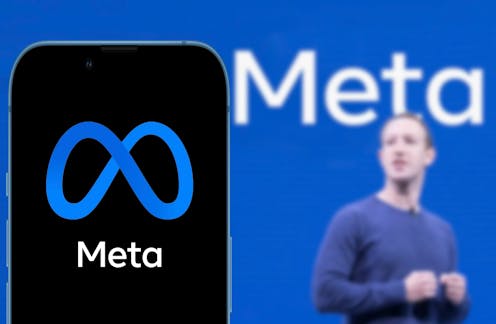Big tech firms like Meta forced to pay for news, under Albanese government’s ‘news bargaining incentive’ charge
- Written by The Conversation

Big tech companies would have to either do deals with news organisations to help fund journalism or pay a charge to the Australian government, under a new plan announced by the Albanese government on Thursday.
The new plan follows the Morrison government-era system introduced in 2021 known as the news media bargaining code, which saw companies such as Google and Meta (which owns Facebook, Instagram and Whatsapp) pay news organisations to help fund journalism.
A press release issued on Thursday by Assistant Treasurer Stephen Jones and Communications Minister Michelle Rowland said the federal government is:
establishing a News Bargaining Incentive to encourage digital platforms to enter into or renew commercial deals with news publishers. Australia does not intend to raise revenue from this policy.
Platforms that choose not to enter or renew commercial agreements with news publishers will pay the charge. Platforms with these agreements will, however, be able to offset their liability.
The incentive will apply to large digital platforms operating significant social media or search services irrespective of whether or not they carry news.
The design of the scheme is yet to be finalised, and the government says a public consultation paper is expected to be released in early 2025.
So, how did we get here – and what might happen if Meta failed to comply?
How did we get here?
The news media bargaining code worked well for its first three years, but Meta has now taken the view it should not be paying for news. It announced earlier this year it would not renew the news media contracts it had in place.
In contrast, Google has contracts that have been renewed for at least a year. It has decided it is still worth paying for news; if you did a Google search and news didn’t come up at all, it would be a pretty poor search engine.
So we have Meta saying no, and this is consistent with Meta’s approach in Canada; Canadian news has been blocked from Meta platforms since August last year.
Only companies that are “designated” under the bargaining code have to comply with the provisions in the code. The Albanese government has taken the view that if it designates Meta under the news media bargaining code, it is likely Meta would cease offering news services in Australia in the same way it did for a few weeks in 2021, and the same way it has done in Canada.
So the federal government is thinking of a different approach.
A different approach: an ‘incentive charge’
The new approach is to say to big tech firms, basically, “If you have contracts with news media businesses, then just carry on. If you don’t, then you need to pay a charge.”
It’s a bit like the system with private health insurance in Australia; if you don’t have private health insurance, you pay a slightly higher Medicare levy. And if you do have it, you don’t have to pay the higher Medicare levy.
So today’s announcement would mean very large online platforms that don’t have deals in place for news would pay this new charge. The revenue would then be used for public interest journalism or in a way that pays the news media businesses that otherwise would have been paid if they did have deals with big platforms.
Either way, news media organisations will get some money out of the big platforms.
This new plan is taking the view that the news bargaining code from 2021 worked OK for a while and it worked OK for some businesses, but it didn’t work for Meta, so we need another approach.
This new approach is similar to an idea colleagues and I proposed in our submission to a parliamentary committee examining this and other online issues.
Regulating big platforms
Another part of the plan would be to create a new system that requires the big platforms to be subject to the new regime.
The government says that it will consult on this, and has set a threshold that means only platforms with Australian revenue above $250 million per year will be affected.
One option that may flow from the consultation is licensing, in the same way we license telcos.
There was no mention of licensing in today’s press release. But, in theory, the government could just say to Meta and Google, and other firms like it, that in order to operate the type of business you have in Australia you need to comply with the obligations.
It could say that one of the conditions of your licence in Australia is that you follow the rules about either paying news media organisations, or paying the charge.
Would Meta comply?
Under this new system Meta would have to ask itself: do we still want to do business in Australia or not?
The vast amount of advertising revenue they get in Australia suggests that failing to comply would be cutting off their nose to spite their face. Rather than pay the charge, they would exit and forgo all that ad revenue.
So my expectation is they would rather just pay the charge.
It was interesting to note that the new “incentive charge” announced today will apply to large digital platforms operating significant social media or search services “irrespective of whether or not they carry news”.
In other words, even if it refused to have news media content on Facebook or Instagram or Whatsapp, Meta would still have to pay the charge (unless they did deals with news media organisations).
The government appears to be very keen to take on this fight. In the lead up to the election there are no votes to be lost in kicking supermarket bosses and Meta bosses.







